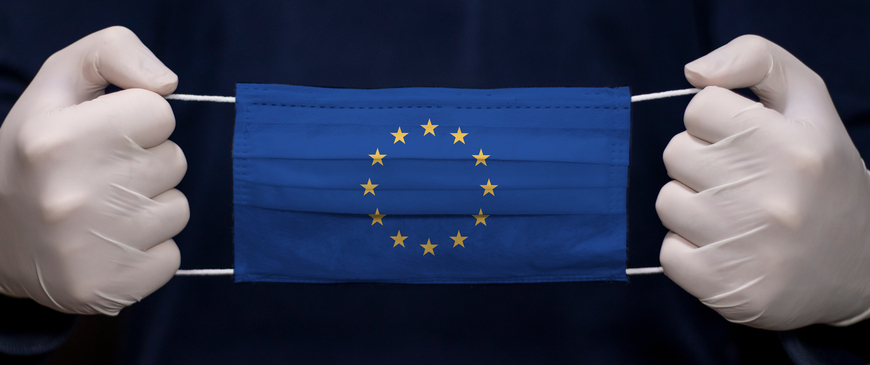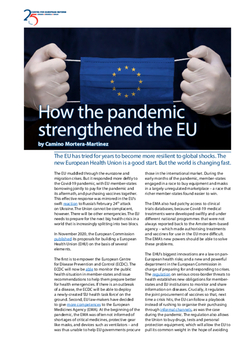
How the pandemic strengthened the EU
The EU has tried for years to become more resilient to global shocks. The new European Health Union is a good start. But the world is changing fast.
The EU muddled through the eurozone and migration crises. But it responded more deftly to the Covid-19 pandemic, with EU member-states borrowing jointly to pay for the pandemic and its aftermath, and purchasing vaccines together. This effective response was mirrored in the EU’s swift reaction to Russia’s February 24th attack on Ukraine. The Union cannot be complacent, however. There will be other emergencies. The EU needs to prepare for the next big health crisis in a world that is increasingly splitting into two blocs.
The pandemic made the EU stronger. But the world has changed rapidly in the past two years. The EU needs to prepare for the next big health crisis in a world that is increasingly splitting in two.
In November 2020, the European Commission published its proposals for building a European Health Union (EHU) on the basis of several elements.
The first is to empower the European Centre for Disease Prevention and Control (ECDC). The ECDC will now be able to monitor the public health situation in member-states and issue recommendations to help them prepare better for health emergencies. If there is an outbreak of a disease, the ECDC will be able to deploy a newly-created ‘EU health task force’ on the ground. Second, EU law-makers have decided to give more competences to the European Medicines Agency (EMA). At the beginning of the pandemic, the EMA was often not informed of shortages of critical medicines, protective gear like masks, and devices such as ventilators – and was thus unable to help EU governments procure those in the international market. During the early months of the pandemic, member-states engaged in a race to buy equipment and masks in a largely unregulated marketplace – a race that richer member-states found easier to win.
The EMA also had patchy access to clinical trials databases, because Covid-19 medical treatments were developed swiftly and under different national programmes that were not always reported back to the Amsterdam-based agency – which made authorising treatments and vaccines for use in the EU more difficult. The EMA’s new powers should be able to solve these problems.
The EHU’s biggest innovations are a law on pan-European health risks; and a new and powerful department in the European Commission in charge of preparing for and responding to crises. The regulation on serious cross-border threats to health establishes new obligations for member-states and EU institutions to monitor and share information on diseases. Crucially, it regulates the joint procurement of vaccines so that, next time a crisis hits, the EU can follow a playbook instead of rushing to organise their purchasing through informal channels, as was the case during the pandemic. The regulation also allows the Union to buy drugs, tests and personal protection equipment, which will allow the EU to pull its common weight in the hope of avoiding the shortages Europe experienced during the early months of the pandemic.
The EU’s new Health Emergency Preparedness and Response Authority (HERA) is an ambitious endeavour. It is in charge of gathering intelligence on threats to public health and will fund R&D on drugs, vaccines and medical devices so that, when a crisis hits, the EU has the technology to face it. When necessary, HERA will also buy and stockpile vaccines, drugs or medical equipment for the member-states. And it can trigger a pan-European state of public health emergency, which will allow the Commission to take decisions quickly, and activate emergency funding. HERA can also act in case of nuclear or chemical attack, or in emergencies stemming from climate change. HERA has sweeping powers: never before has the EU been allowed to purchase and stock critical material or to switch to emergency decision-making in the same way national governments do in times of crisis. Whether the EU’s new powers on health work will be unclear until the next crisis, but experts are optimistic.
The EU’s next public health problem to tackle – bar another pandemic – will be money and growing geopolitical tensions. The European Commission hoped that the bloc’s (ultimately successful) joint procurement of Covid-19 vaccines would help justify a bigger budget for contingency planning. The International Monetary Fund thinks mitigating the effects of the pandemic will cost the world $12.5 trillion by 2024. Preparing for it would have been much cheaper. But with a war next door, an energy crisis and inflation at a record 10.6 per cent in the eurozone, the EU faces too many competing budget demands. Although HERA has a budget of €6 billion for 2022-2027, member-states are less willing than at the height of the pandemic to commit more funds to the EHU. Senior officials worry that political momentum has been lost.
Another urgent task for the EU is to secure meaningful reform of the World Health Organisation (WHO). It was too slow to declare a global emergency at the start of the pandemic, and initially failed to investigate whether Beijing was right to claim that the virus was not transmissible between humans. But tense relations between Washington and Beijing, exacerbated by suspicions over China’s handling of the Covid-19 outbreak, make much needed reform harder to achieve. Like most international organisations, the WHO works by consensus and nothing can be done unless all member countries agree. This is particularly worrying in the case of public health: if something like Covid-19 emerged in a world where Russia is isolated and China and the US are increasingly at loggerheads, what would happen? Officials worry that channels of communication are closing: neither HERA nor BARDA (its US equivalent) have contact with their Chinese counterparts; and informal communication between Western and Chinese scientists (which led to the discovery and sequencing of SARS-CoV-2’s RNA in the early stages of the pandemic) has become less frequent.
Preparation for another pandemic requires the Union to assess where it has supply vulnerabilities and either to build well-maintained stockpiles or to ensure that domestic suppliers will be able to raise production of drugs, protective equipment and medical devices to meet a sudden explosion in demand. The EHU is well-equipped to do that. But the question remains about how to get these supplies cheaply and quickly for stockpiles or in the middle of a crisis. At least in the short term, the EU will still have to source some low value-added products, like masks, from Asia; and some higher-added value goods, like medicines, from the US. But there will be more government intervention in the international supply chains for critical drugs and the chemicals that are needed to make them, and higher value-added medical devices, such as ventilators. This will force the European Union to reduce its dependency on imports, as the French have been advocating for years. In the words of a senior EU official, “it is not that the French are winning. It’s that the world is becoming more French”. Russia’s weaponisation of its energy supplies to Europe has confirmed their view.
The new European Health Union allows the EU to assess where it has supply vulnerabilities and to ensure that domestic suppliers will be able to raise production to meet a sudden explosion of demand.
The pandemic increased the powers of the European Commission and changed the way the European Union worked in many policy areas, not only health. It also showed that the EU needed more effective tools to deal with public health emergencies; the EHU is a big step in the right direction. The EU’s response to Russia’s attack on Ukraine has built on the lessons of the pandemic, with member-states giving the EU institutions more latitude to act quickly rather than laboriously crafting compromises. Other crises will arise: member-states should already be thinking about how the EU can leverage its regulatory and other powers to combat threats – whether viruses or foreign leaders – that do not respect Europe’s national borders.
Camino Mortera-Martinez is head of the Brussels office at the Centre for European Reform.

